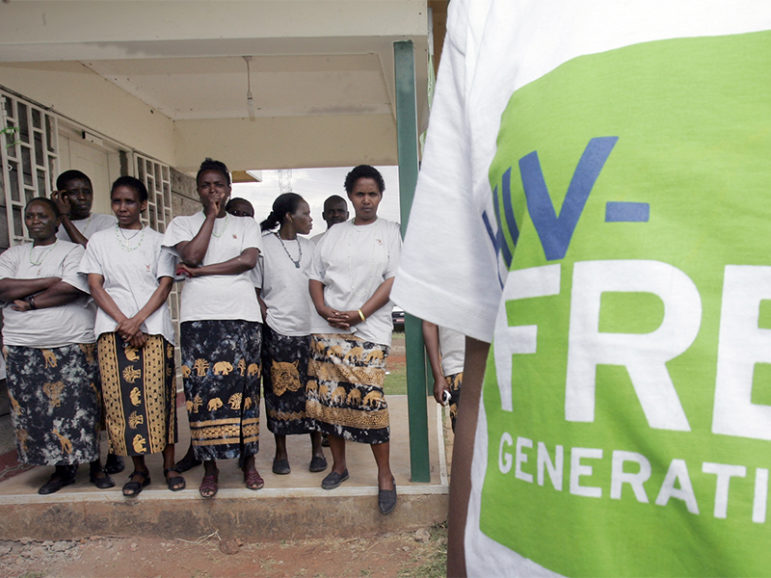(RNS) The Trump administration will allow Ambassador Deborah L. Birx, an Obama appointee to the President’s Emergency Plan for AIDS Relief, to remain in office until the Senate confirms her successor.
That means the initiative, known as PEPFAR, will maintain its leader and mission at a time when the new president is intent on replacing many Obama administration appointees and reversing the direction of many government programs.
[ad number=“1”]
With a budget of $6.7 billion, PEPFAR has a mission of treating 11.5 million people globally with anti-retroviral drugs, with the goal of providing 25 million people — the vast majority in Africa — with these drugs by 2030.
After first inveighing against AIDS as a judgment against homosexual promiscuity, evangelical Christians have rallied to help staunch the disease and treat those infected with HIV, the virus that causes AIDS.
Evangelicals were closely involved in creating the AIDS relief office, which was launched in 2003 by then-President George W. Bush. It was significantly strengthened during Barack Obama’s presidency.
Experts believe unless effective prevention is achieved in Africa, HIV will remain at epidemic levels for many years to come.
[ad number=“2”]
Birx, a graduate of Houghton College in New York and a lifelong evangelical, spoke to RNS about her work. The interview has been edited for clarity and length.
Experts see an inflection point in the next four years in which new HIV infections will drop sharply if millions more people receive lifesaving drugs. Do you agree with this forecast?
I believe it. There is great promise of success but also great chance of failure if you get off track. Will we get every country over that inflection point in the next four years? I don’t think so.
President Trump could lead us to a place to where 10 to 12 of the highest burdened countries can get over that inflection point. President Trump can show control of this pandemic.
How essential is it for churches to be directly involved?

Ambassador-at-Large Deborah L. Birx, M.D., is the coordinator of the United States Government Activities to Combat HIV/AIDS and U.S. special representative for global health diplomacy. Photo courtesy of U.S. Department of State
We have lifesaving treatment, but we have to prevent new infections. That’s the place churches around the world can really re-engage. Many faith-based organizations are working with orphans and vulnerable children. It is not enough to care for a child until he is 3 or 4 years old; we have to be sure he thrives at 16 and 17. Youth pastors are so important because they can speak the language of what’s happening with the adolescent girl or boy and they can connect with the senior pastor.
To get pastors once again to talk about HIV and the risk to young women and young men across southern Africa has been really difficult. You see complacency everywhere that HIV is an old story and it is not relevant today.
We have to figure out with leaders of faith ways to launch a new campaign around wellness. It can be grounded in the fundamentals of HIV, but it is broader than that.
The churches can really start that dialogue around what wellness should look like. You maintain wellness by preventing disease and infection.
Sexual abstinence programs and behavior change programs have become so discredited. Is there any role left for them in prevention?
That is the fundamental issue and why prevention cannot be done without the churches. There has been a delay when young women are initiating sex. That is terrific. But when we look at the data, a third of young women are raped as their first sexual experience. You have to talk about that and the need for change.
We cannot put all of the pressure on the young woman and say “this is your responsibility to stay HIV-negative” when the young woman’s experience was that she was raped at 13.
The conversation has become more complex. People are talking about abstinence around young women, their mothers and their grandmothers who have experienced sexual violence. We now know the level of complexity, but we are not addressing it in a comprehensive way to lead to better outcomes for young women.
[ad number=“3”]
What new approach are you trying?
We launched DREAMS (Determined, Resilient, Empowered, AIDS-free, Mentored, Safe) for young women, a comprehensive wraparound package at the family, community, church and adolescent levels. We have reached 1 million girls in the first year.
What cultural practices place girls at risk of infection?
The biggest issue is the puberty rite of transition. Instead of empowering young girls, it is putting them at heightened risk. It often results in very specific sexual assault against young girls. It is about the psychological impact it has on a young girl when she sees herself in a community as an object of sexuality, not an object of importance.
We are always looking for the girls at highest risk and the most vulnerable. We are not just reaching the easy, but the all.
How do we together cross that divide between cultural practices and biblical teachings? I have always been impressed in the New Testament of what it took. You have to be willing to be in service to all people, not just the people who many want to see served. That’s what PEPFAR is. I do my part to show the compassion of the American people and the translation of their compassion through PEPFAR. I will be somewhere in this until it gets finished.
(Timothy C. Morgan is an RNS correspondent)





